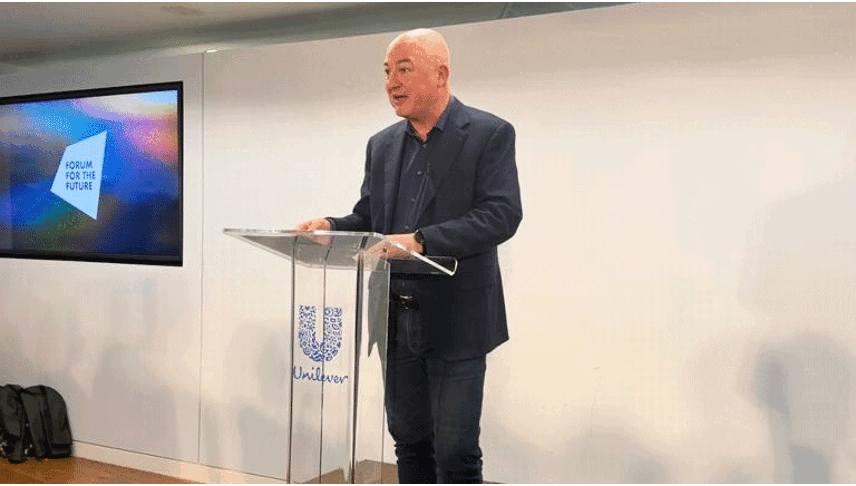Register for free and continue reading
Join our growing army of changemakers and get unlimited access to our premium content

Image: Luke Nicholls for edie
Jope, speaking at the consumer goods’ firm’s London offices late last week, said: “The time for incrementality is long gone. The problems we’re facing are far too big for an incremental approach.”
In order to move beyond incremental changes and towards step change, Jope advised listeners to “not work in the system, but to work on the system”.
Jope’s speech formed part of the farewell event for Forum for the Future’s founder-director Jonathon Porritt, who is stepping down after almost 30 years to dedicate more time to environmental advocacy and activism.
Unilever was one of the Forum’s first corporate clients and certainly its first client of this size. The two organisations have been collaborating for 27 years.
Jope, a 35-year Unilever veteran, recounted the early days of this partnership. He said: “When the Forum was first founded, the concept was quite a unique one – to work with companies and organisations in a spirit of collaboration to try and effect change from within, rather than simply remaining an activist voice from outside. It was an approach that was very novel, that did not sit comfortably with everyone, in particularly the NGO community.”
Now, Jope added, appointing an external organisation as a “critical friend” is “certainly not an unusual approach” in the private sector. The Forum’s other clients include Aviva, Bupa, Capgemini and Marks & Spencer.
Sustainable Living Plan
Jope credited the Forum with giving Unilever the push it needed, under his predecessor Paul Polman, to introduce its first Sustainable Living Plan.
Launched in 2010, the Plan was one of the first from a corporate that coupled profitability with environmental sustainability and social impact.
The Plan was built upon in 2021 with a new Climate Transition Action Plan, outlining how Unilever would finance the delivery of its 2039 net-zero target and updated nature targets. At the company’s 2021 AGM, more than 99% of shareholders voted in favour of this update.
Unilever’s AGM this year, which was hosted earlier this month, was a little more dramatic.
Almost 60% of votes at the AGM were cast against its remuneration plans for the upcoming year. The crux of the issue were plans to increase the chief executive’s base salary by one-fifth when Jope departs and his successor, Hein Schumacher, takes the reins in July.
Only 13 rejections of executive pay plans have been made at FTSE100 firms’ AGMs since 2000, according to Minerva Analytics.
Drama also came in the form of Friends of the Earth, which is imploring Unilever to stop sourcing palm oil from Astra Agro Lestari due to allegations of human rights abuses. The campaigners also pressed Unilever to update the interim targets to cut emissions in the Climate Transition Plan, questioning the grounds on which Unilever was describing them as science-based.
Forum for the Future’s Porritt called the action “ironic” given that he directed Friends of the Earth Britain from 1984 to 1990.
Porritt said: “By all accounts, the chairman and [chief executive] did a reasonably good job of assuring protestors… But, like every other chair and chief of every other progressive company, here is what they could not say at their AGM: ‘Actually, we entirely agree with what you are saying and we stand ready to meet your demands, once you get today’s utterly useless politicians to reframe the markets in which we still have to compete as much as ever. To mandate – or, if they haven’t got the balls to mandate – to incentivise what we know we all need to do.’
“They don’t have to use that kind of language, but it really would be good to hear a few businesses actually speaking out and telling us what reality looks like when it comes to who can make things happen for society. We all know these governments are where the failure really lies.”


Please login or Register to leave a comment.